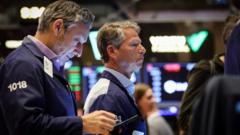Concerns rise over potential global economic repercussions as markets react negatively.
**Trump's Upcoming Tariffs Will Affect All Countries, Not Just Rivals**

**Trump's Upcoming Tariffs Will Affect All Countries, Not Just Rivals**
President announces sweeping trade measures branded as "America's Liberation Day" this Wednesday.
As President Donald Trump prepares to unveil new tariffs this week, he has stated that these measures will impact all nations, rather than just those with significant trade imbalances with the United States. The anticipated announcement, scheduled for Wednesday, has been dubbed "America's Liberation Day" by Trump himself. This comes on the heels of existing tariffs on aluminum, steel, and vehicles, alongside increased levies on imports from China.
Market reactions have already surfaced, with Asian stock indices experiencing declines on Monday as investors express concern over the worldwide economic implications of these tariffs. "You’d start with all countries," Trump remarked to reporters aboard Air Force One, pointing out that virtually every nation will be affected.
Although previous statements from Trump suggested a possible moderation of his tariff strategy—imposing lower rates on certain imports—his current rhetoric emphasizes a broader taxation approach. White House economic advisor Kevin Hassett recently suggested that forthcoming tariffs might specifically focus on 10 to 15 countries with the most unfavorable trade balances with the US, although no specific nations were mentioned.
Trump believes that tariffs will safeguard the American economy from unfair foreign competition and serve as leverage in negotiating better trade agreements. His advisors pointed out that the tariff measures could potentially generate trillions of dollars and lead to job creation within the United States. Pete Navarro, Trump’s chief trade advisor, provided projections indicating that taxes on car imports could yield around $100 billion from a trade volume of $240 billion, and overall tariffs could net approximately $600 billion—representing one-fifth of all US imports.
The prospect of a trade war, however, is causing unease among traders and investors, heightening fears of a potential recession in the US. Immediate market reactions in Asia saw significant declines, with Japan's Nikkei 225 down over 3%, Australia’s ASX 200 falling by 1.6%, and South Korea's Kospi decreasing by about 2%.
These developments elevate the stakes for countries attempting to negotiate trade agreements with the US, including the UK. Concurrently, countries like the EU and Canada have announced plans for retaliatory measures in response to Trump's decision.
In another arena, Trump also mentioned that a resolution concerning TikTok’s sale from its Chinese owner, ByteDance, is expected to be finalized before the approaching deadline on Saturday, which he initially set in order to address national security concerns that may lead to a ban on the platform within the US.
Market reactions have already surfaced, with Asian stock indices experiencing declines on Monday as investors express concern over the worldwide economic implications of these tariffs. "You’d start with all countries," Trump remarked to reporters aboard Air Force One, pointing out that virtually every nation will be affected.
Although previous statements from Trump suggested a possible moderation of his tariff strategy—imposing lower rates on certain imports—his current rhetoric emphasizes a broader taxation approach. White House economic advisor Kevin Hassett recently suggested that forthcoming tariffs might specifically focus on 10 to 15 countries with the most unfavorable trade balances with the US, although no specific nations were mentioned.
Trump believes that tariffs will safeguard the American economy from unfair foreign competition and serve as leverage in negotiating better trade agreements. His advisors pointed out that the tariff measures could potentially generate trillions of dollars and lead to job creation within the United States. Pete Navarro, Trump’s chief trade advisor, provided projections indicating that taxes on car imports could yield around $100 billion from a trade volume of $240 billion, and overall tariffs could net approximately $600 billion—representing one-fifth of all US imports.
The prospect of a trade war, however, is causing unease among traders and investors, heightening fears of a potential recession in the US. Immediate market reactions in Asia saw significant declines, with Japan's Nikkei 225 down over 3%, Australia’s ASX 200 falling by 1.6%, and South Korea's Kospi decreasing by about 2%.
These developments elevate the stakes for countries attempting to negotiate trade agreements with the US, including the UK. Concurrently, countries like the EU and Canada have announced plans for retaliatory measures in response to Trump's decision.
In another arena, Trump also mentioned that a resolution concerning TikTok’s sale from its Chinese owner, ByteDance, is expected to be finalized before the approaching deadline on Saturday, which he initially set in order to address national security concerns that may lead to a ban on the platform within the US.






















